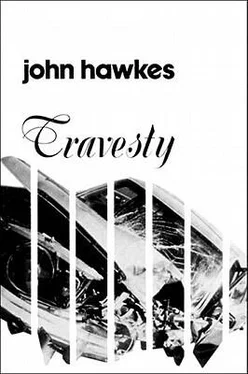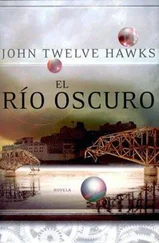And yet I must say it. I regret the fire. Here even I am helpless. My theory does not apply to exploding gasoline. And I am sure that you will appreciate the fact that my attitude toward the burning of our demolished car has nothing to do with any personal feeling of mine against roadside cremation. On that score I am indifferent. But if I were able to prevent that burst of flame, to obliterate the sparks before their very inception and so stop the hot flame, the sheet of light, the fire that will turn to brightness the entire area of wall, wreckage, gasoline spreading and thus extending still further the circle of this most intense visibility-yes, if I could eliminate the flames I would. Yes, it seems to me that if we preserve this scene in all its magnitude and with all its confounding of disparate substances and with its same volume of sound, but remove from it the convention of fierce heat and unnaturally bright light, so that this very explosion occurs as planned but in darkness, total darkness, there you have the most desirable rendering of our private apocalypse. Announced by violent sound and yet invisible, except for the glass scattered like perfect clear grains across an entire field — what splendor, what a perfect overturning of ordinary expectation. The unseen vision is not to be improved upon.
Well, you will understand that in much the same way I would prefer that the remains of our crash go undiscovered, at least initially. I would prefer that these remains be left unknown to anyone and hence unexplored, untouched. In this case we have at the outset the shattering that occurs in utter darkness, then the first sunrise in which the chaos, the physical disarray, has not yet settled-bits of metal expanding, contracting, tufts of upholstery exposed to the air, an unsocketed dial impossibly squeaking in a clump of thorns- though this same baffling tangle of springs, jagged edges of steel, curves of aluminum, has already received its first coating of white frost. In the course of the first day the gasoline evaporates, the engine oil begins to fade into the earth, the broken lens of a far-flung headlight reflects the progress of the sun from a furrow in what was once a field of corn. The birds do not sing, clouds pass, the wreckage is warmed, the human remains are integral with the remains of rubber, glass, steel. A stone has lodged in the engine block, the process of rusting has begun. And then darkness, a cold wind, a shred of clothing fluttering where it is snagged on one of the doors which, quite unscathed, lies flat in the grass. And then daylight, changing temperature, a night of cold rain, the short-lived presence of a scavenging rodent. And despite all this chemistry of time, nothing has disturbed the essential integrity of our tableau of chaos, the point being that if design inevitably surrenders to debris, debris inevitably reveals its innate design. Until one day two boys stumble upon the incongruity of a once beautiful automobile smashed in the barnyard of an abandoned farm. For them the spectacle yields only delight: a little plastic-coated identity card winking in the sunlight, dead leaves nesting in the wheels which lie on their sides, a green shoot growing from the mouth of the rusty and half-crumpled fuel tank. Indeed, this spectacle now exists merely for them, merely for the pleasure of two boys in ill-fitting trousers and wooden shoes. But who better might we have as witnesses?
Well, it is impossible. It is not to be. Nothing will prevent our sudden incandescence in the night sky. And then we shall have blue lights, motorcycles, radio communications, the arrival of several of our little white ambulances. By dawn they will be hauling apart our wreckage with hooks and chains, and by noon of that first day there will be nothing left but the smell of gasoline and the dark signs of a recently extinguished fire. They will make notes, take photographs, climb through the elbows of hot metal, and then tow it all away with their clumsy trucks.
How sad it is, cher ami. What a brutal sport.
Perhaps if you make an effort to remain still, to position your arms so as to allow your chest room enough for its greatest possible expansion, and then breathe in slow conscious cadences through your open mouth, perhaps if you undertake these measures you will be more comfortable. But it is an unfortunate development, this partial suffocation resulting from that dreadful constricting of the bronchial tubes. I can imagine the growing panic of not being able to breathe, cher ami. You have my sympathies. Apparently your various nervous and physiological systems are quite dedetermined not to be outdone by all the failures, impairments, of our poor Chantal. Now that the seizure is upon you, so to speak, I do remember your bitter description of yourself as an infrequent but nonetheless violent sufferer of this diabolical chest affliction. Generally it is a childhood illness, is it not? But the unfortunately unavoidable extremity of artificial heat, the closeness of the air around us, the effect of your cigarettes on a chest condition as sensitive as this one is, and of course the severe emotionalism of your present state — no doubt all this is conducive to one of your infrequent attacks, as you call them, of thick and heavily labored breathing. And then the whole thing is circular, is it not? The greater the pain, the greater the weight bearing down on your chest, the louder that dreadful rasping sound (it is indeed a curiously annoying sound, cher ami), the greater your own fury which, being directed at the self, of course, only gives still greater impetus to the whole wheezing machine.
Well, you have my sympathies. The onset of this condition of yours, with its promise of facial discoloration and even loss of consciousness so evident in every rattling breath you take, must certainly come as the final outrage, like eczema on top of leprosy. And unless I am mistaken, by now you are quite wet with perspiration. I suppose the body expresses what the mind refuses to tolerate, which probably says something about my own single lung and satisfactory respiratory system. But I would give you relief if it were in my power. Fields of oxygen, the smell of a blue sky. … I wish I could give them to you, cher ami. As it is, I am certainly going to find it harder to hear your voice, while for you it will be much more difficult to concentrate on anything but these increasing indications of expiring breath. But perhaps you should remember that it is only the rarest person who is not in one sense or another gasping for air.
Our villages carved out of old bone, our forests shimmering with leaves the color of dried tobacco, our village walls over which the dead vines are draped like fishing nets, the weight of the stones that occupy the slopes of our barren hills like sculpted sheep, the smell of wood smoke, the ruby color of wine held to the natural light, the white pigeon drawn to the spit even as he becomes aroused on the rim of the fountain-surely there is no eroticism to match the landscape of spent passion. There is nothing like an empty grave to betray the presence of a dead king in all his lechery. The blasted tree contains its heart of amber, you can smell the wild roses in the sterile crevices of ancient cliffs, suddenly you find the whitened limb of a tree sleeved in green. Yes, ours is a landscape of indifferent hunters and vanished lovers, cher ami, so that but to exist on such a terrain, aware of blood and manure, of the little paper sacks of poison placed side by side with bowls of flowers on the window ledges of each village street, or aware of the unshaven faces of our local pharmacists or of the untended pubescence of the girls who work in our markets and confess their fantasies in our darkened churches-yes, simply to exist in such a world is to be filled with a pessimism indistinguishable from the most obvious state of sexual excitation. I am a city person and not without my own form of pragmatism. And yet whenever I have seen from the window of this very car a glimpse of a distant woodland, I have thought of the royal hunting party mounted and in pursuit of a fevered stag, and thought of the sound of the horns, the lovers in that boisterous army, pretty and plumed, flushed and separated on their tossing horses but riding only in wait for the day of the chase to give way to the night of the tryst, when the mouth that took the brazen hunting horn by day will take the elegant and ready flesh by night. Yes, we who are the gourmets and amateur excavators of our cultural heritage know in our cars, our railway trains, our pretentious establishments of business, that we have only to pause an instant in order to unearth the plump bird seasoning on the end of its slender cord tied to a rafter, or a fat white regal chamber pot glazed with the pastel images of decorous lovers, or a cracked and dusty leather boot into which some young lewd and brawny peasant once vomited.
Читать дальше












